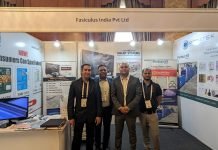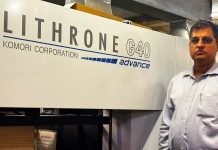Navi Mumbai-based Rukson Packaging has a quarter century’s experience in the carton packaging business. The company started from a 700 square foot unit in the Mumbai suburb of Mulund, and over two and half decades, it has seen its operations expand exponentially. With robust growth in volumes over the years, it has, since 2009, established a 35,000 square foot plant in Navi Mumbai. 78-year old founder Kishin Panjabi still manages the business, ably assisted by son Gobind Panjabi.
Rukson produces various types of cartons specializing in met pet (metalized polyester laminated to board) cartons. Customers come from the pharmaceutical, FMCG, and cosmetics industries. The company also prints inserts and outserts for pharmaceutical applications. Over its 25 years, the company has progressively used a variety of printing and converting equipment. In its pressroom, Rukson has mostly relied on Heidelberg technology, with its first press a Heidelberg SORKZ 2-color and recently commissioned a brand new Speedmaster CS 92 5-color plus coater press. Five sheetfed offsets run in its pressroom – the brand new Speedmaster CS 92 5+L, a Komori LS-632 6-color plus coater UV press, a Komori 2-color, a Heidelberg SORMZ, and a Heidelberg SORM.
The company’s converting section led by Bobst and Acme equipment can handle several types of cartons with extreme agility. These include Bobst Novacut, and 102 SE die cutters, and Bobst Ambition and Expertfold folder gluers. There is also an Acme folder gluer, three hand-punching machines, a stripping machine, two Polar cutting machines, a Heiber and Schroder window patching and liner machine, and a Zhongke lamination machine. The prepress department contains Esko software and the Esko Kongsberg XE10 cutting and creasing sample making table, and a Cron platesetter.
Rukson converts about 300 tons of paper board into cartons every month. Its production is likely to rise to between 400 and tons of cartons monthly with the newly added CS92 5-color plus coater press.

Robust Heidelberg technology at play
Gobind Panjabi says that the overall robust and state of the art technology of the Speedmaster CS 92 was most attractive. The order for the press was finalized in December 2019. While it landed at the Navi Mumbai unit in August, its installation and commissioning took place in the second half of September. The internal resources of the company financed the purchase of the press.
“We bought the brand new Komori 6-color in 2015. However, when it came to getting the second press, we tried out every possible option and finally settled with the Heidelberg Speedmaster CS 92. We have used several Heidelberg presses over the last 25 years and have been a big admirer of their technology. With the Speedmaster CS 92, we get the latest technology, robust design, and quality after-sales,” says Gobind Panjabi.
The Speedmaster CS 92 flexibly prints a variety of imposition layouts in the 92 cm or 37-inch format. Launched at China Print 2015, the new format press is available in standard four and 5-color configurations with and without coater or in a 6-color plus coater configuration. For printers looking to diversify their print mix, the CS 92 is also available with UV curing. Built on the Speedmaster CD 102 platform, the CS 92 prints up to 15,000 sheets an hour on substrates from 30 gsm to 0.8mm. According to Gobind Panjabi, their Speedmaster CS 92 has been running at its maximum speed since commissioning in September.
Peter Rego, Business Head – Sales Heidelberg India adds, “The CS 92 is a strategic deal with Ruksons Packaging which will boost their overall efficiency and give them the flexibility to cater to all kinds of jobs, be it FMCG or Pharma jobs. The CS 92 comes with all the latest features from Heidelberg to reduce touch points, reduce down times and change over times – to reduce waste and power consumption and maximize profits.”
“Since the very start, we have been running the Speedmaster CS 92 at the maximum speed. Heidelberg’s claim of 15,000 sheets per hour is perfectly true. Not many presses can get to their maximum rated speed with consistency,” says Gobind Panjabi.
Rukson shines during the lockdown
Aside from the initial hiccups at the very start of the lockdown, Rukson has been in production throughout. Very busy during April and May, both Kishin and Gobind Panjabi led from the front to keep the factory running safely.
“The initial period on the lockdown was difficult, but my father, despite his age, and I were at the factory every day. It was our obligation to serve our customers. The business we did during the first few months of the lockdown was huge, both in pharmaceutical and FMCG segments,” says Gobind Panjabi.
Although the rush seen in the initial periods of the lockdown has slowed down, Gobind Panjabi expects the year 2020-2021 to be extremely successful for the business. “The current financial year has been excellent for us till now, and we assess that the trend will continue for the full year. I will not spell out the numbers, but I can say that we will surpass the targets we set for the full year by a good margin,” Gobind Panjabi concludes.










